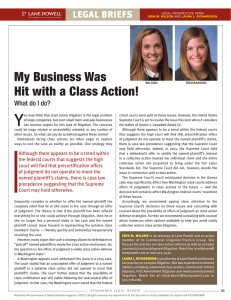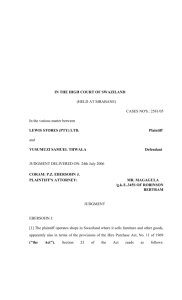B. Procedure and
advertisement
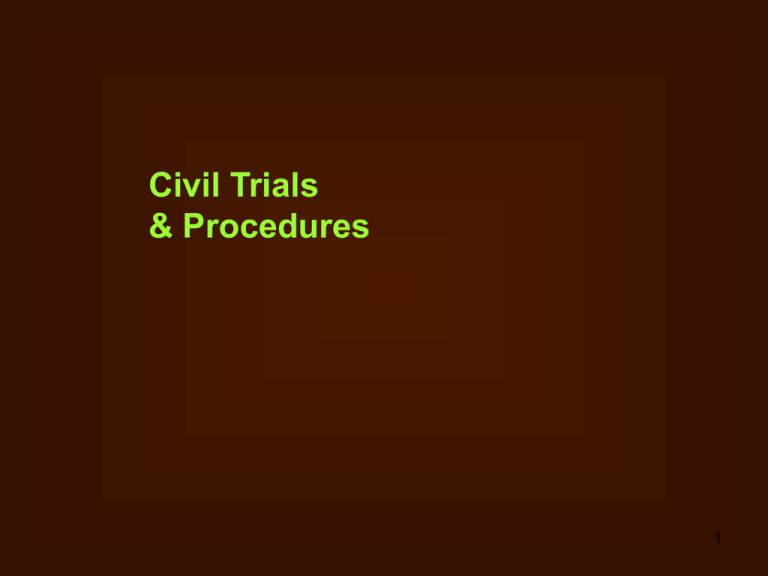
Civil Trials & Procedures 1 I. LITIGATION PROCESS A. Litigation is a ____________________ (up-front cost) process 1. “________” theory results in pre-trial process designed to provide everyone all relevant information before trial 2. Civil cases = many people argue that litigants use the discovery process to increase costs, time (probably true) 3. Not unusual for case to take two to four years to get to trial 4. In most types of cases, attorneys ___________ agree to a “contingent” fee – so client must pay fees as work is done a. Contingent fee cases essentially limited to personal injury cases b. Article (on course website) about banks financing litigation on a contingent basis » Late night TV advertising by “contingent financing” companies 2 II. CIVIL TRIAL PROCESS A. Pleadings 1. 2. As in text, formal allegations & denials are very general a. Important only in setting the initial starting point — Will show if Plaintiff seeking “law” or “equity” remedy b. In federal court initial pleadings (complaint) must show ___________________ [ federal question, diversity ] c. In federal court, after discovery, parties and court create a “pretrial order” that is much more specific on issues, etc. Many documents filed with court are not part of “the pleadings” a. All __________ (discovery, MSJ, etc.) b. Affidavits, papers, etc., do not change the pleadings 3 B. “Discovery” 1. Primary objective = everyone has ____________ about the facts known by other side a. b. c. 2. Potential witnesses, what facts/info each may have All documents that might be relevant Opportunity to examine physical evidence Rules on what is “discoverable”: a. Questions, requests, documents, etc., that ___________, or ________________, admissible evidence b. If there is some reasonable possibility that it might lead to something relevant, discovery is allowed c. Some persons contend that scope should be narrower, proof of need more specific 4 Failure to cooperate in discovery, especially after order entered, can result in penalties: 1. $$ for costs and attorney fees (both parties’) incurred 2. Order that specific things be considered proven facts (or no evidence admissible against) 3. Case dismissed 5 C. “Interrogatories” (related to “interrogate”) 1. ______________ to be answered (under oath) by designated individual – usually a party or officer of organization 2. In reality, answers normally written by attorney, signed by individual 3. Can be useful in __________ potential witnesses, location of documents, other information helpful in discovery process 4. Failure to answer truthfully and fully can result in sanctions 5. Have become much more of a problem since “automatic, memory typewriters” (predecessor to computers) — Source of many anti-discovery opinions 6 D. Depositions 1. Almost like testifying at trial (good examples in A Civil Trial ) 2. Questions can be asked that ______________ be asked at trial 3. Different ________________ can be asked than during trial 4. If responding side objects to a question: a. b. c. 5. Object “for record” Might instruct witness not to answer Deposition can be suspended while court requested to order an answer Are more expensive and time-consuming than interrogatories » Can result in better information than written questions » have opportunity to observe witness, etc. 7 E. Inspection of physical evidence and documents 1. For documents, normally require producing ______________ a. b. 2. Actually produce copies, with reasonable opportunity to examine original Document production normally requested to be brought to deposition MUST allow reasonable physical inspection a. In A Civil Action, plaintiffs received court order allowing drilling test holes, scientific tests of samples, etc. b. If personal injuries involved, must allow for physical examination of injured parties ________________________ (including psychiatrist if emotional damages claimed) 8 F. Pre-trial “motions” 1. All requests for the court _________________, enter order 2. Only purpose of “trial” is to have someone decide the facts 3. a. If there is no dispute as to the facts, court decides as a matter of law b. Most important motions ask for court to decide the case c. Court must make _______________ about the ______ to decide motion Judgment on the pleadings a. Court assumes that plaintiff can prove everything alleged b. Based on that assumption, does plaintiff have a “cause of action”? 9 4. Motion for Summary Judgment (very important) a. Some information from discovery, affidavits, presented to support motion b. Judge must find two things to grant summary judgment: (1) No genuine dispute [‘issue”] of _______________ (2) Moving party entitled to judgment as _______________ c. Non-moving party must present evidence that shows there are fact issues that cannot be decided on motion d. Tendency of court to not grant due to disputes about facts e. Can be summary judgment ________________, not all — Not unusual for a summary judgment of liability only — Amount and nature of damages not decided f. Trial limited to evidence about part not decided by summary judgment 10 III. TRIAL PROCESS A. Most persons familiar with major features (TV, movies) B. Procedure and “burden of proof” 1. 2. Side with “burden of proof” on an issue _________ if proof insufficient That side gets ____________________ on most trial phases C. General sequence 1. 2. 3. Plaintiff presents “case in chief” – “______________” case » At end (“Plaintiff rests”), defendant usually moves for judgment Defendant presents its case a. Two functions (1) Evidence contrary to Plaintiff’s (2) Evidence supporting any “___________________” b. Questioning, etc., same as in Plaintiff’s presentation Plaintiff has opportunity present witnesses to rebut witnesses 11 produced by Defendant D. Evidence and Testimony 1. 2. 3. Oral testimony is primary evidence a. “My word against hers” = _____________________ » Only oral testimony can be cross-examined b. Documents, photos, physical evidence must be verified by oral testimony in some way Type of questions that can be asked varies during trial a. “Direct” examination – no “leading” questions b. “Cross” examination – limited by subjects in direct c. “Re-direct” – limited by subjects in cross ______________ = “I heard Joe say x x x x x ” a. If to prove that what Joe said was true, NOT ADMISSIBLE b. If to prove that Joe said “x x x x x”, ADMISSIBLE 12 IV. APPEAL PROCESS A. Can appeal if some requested remedy or ruling is not granted at trial 1. “Appellant” states reason why / how trial court made error _________________ 2. All procedures are “_________________” » No testimony, new evidence » Transcript (partial or full) and all admitted evidence is sent to appeals court 3. Parties/attorneys file written argument supporting their position 4. Often “oral argument” is presented to a group of judges (3+) 5. Majority of judges decide, write an opinion » States important facts » States legal issues » States applicable legal rules / laws » Applies rules to facts » States conclusion (affirm, reverse, remand) 13 V. Alternatives to Litigation A. Negotiation, Mediation 1. Negotiation normal in business dispute, mediation not so common 2. Mediation most often in labor disputes 3. Many Texas counties have a “Dispute Resolution Center” that provides mediation services --- Some court procedures allow court to order attempt 4. Persons can always agree to mediate 5. Often helps to have “neutral third party” involved to bring a little objectivity and reality to dispute NOTE: The “mediation” in the movie Disclosure is more like an arbitration hearing. Not too realistic. 14 B. Arbitration = probably the most used alternative 1. Established arbitration groups around the world 2. Established groups have procedural rules, but flexible 3. Advantages: 4. a. b. c. ________ (no over-filled case docket) More participation by parties in setting up process _______________ in how and when hearings held d. Biggest (?) = arbitrators may be knowledgeable about the subject matter of the controversy Arbitration clauses almost mandatory in __________________ » Avoids problems with courts/litigation in some countries Arbitration process very much like trials in Civil Law system. 15

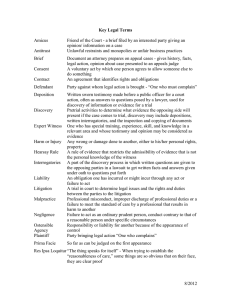

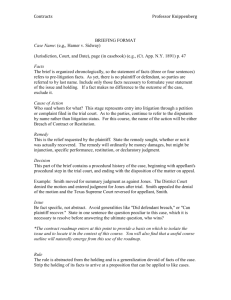
![[2012] NZEmpC 75 Fuqiang Yu v Xin Li and Symbol Spreading Ltd](http://s3.studylib.net/store/data/008200032_1-14a831fd0b1654b1f76517c466dafbe5-300x300.png)
